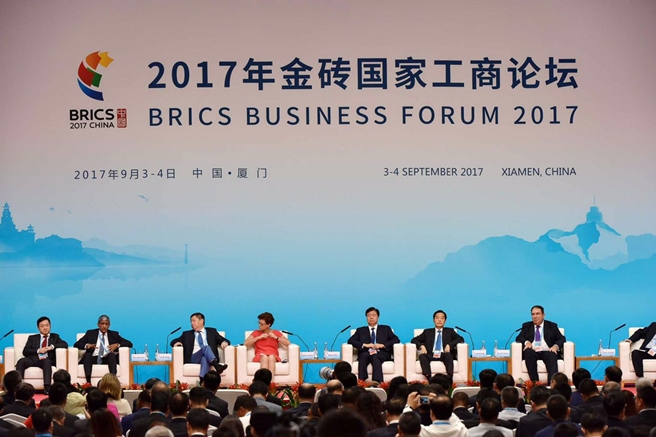
During September 3-4, BRICS Business Forum 2017 was held in Xiamen City, Fujian Province. Chinese President Xi Jinping attended the opening ceremony and delivered a keynote speech. Mr. Frank Ning, Chairman of Sinochem Group and Mr. Zhang Wei, President of Sinochem Group also attended this grand forum. As a guest speaker, Chairman Frank Ning was invited to present his view at Panel Discussion on “Blue Economy”. In his speech, Chairman Frank Ning suggested that BRICS should strengthen cooperation in the energy and chemical industries.
According to Chairman Frank Ning, Chinese economy enjoys skyrocketing development in recent decades, and Chinese petrochemical industry especially develops by leaps and bounds. However, fine chemicals are still relatively backward, and self-sufficiency rate is quite low. Oil and gas depend on imports. Over 50% of chemical products also need to be imported. In the field of fine chemical materials, Brazil and Russia are abundant in natural resources, while China and India demonstrate relatively broad markets. BRICS are characterized in their unique manners. Annual trade amount reaches USD100 billion in the field of fine chemicals (especially fine petrochemicals). Chairman Frank Ning stressed that BRICS have their own leading advantages in terms of resource, technology, market and trade. They can complement advantages each other, and enjoy great cooperation and development potentials for blue economy. To this end, enterprises should grope for the feasible cooperation programs with down-to-earth efforts, and effectively give impetus to the cooperation.
Specifically, firstly, it is necessary to exert greater cooperation efforts for offshore oil and gas exploration and development. BRICS are rich in offshore oil and gas resources, and gather a wide range of experience in offshore oil and field exploration and development. Enormous potentials are implied in the future offshore oil and gas development. BRICS should strengthen cooperation on technology, information and capital in the field of energy exploration and development, sharing both risks and benefits.
Secondly, it is necessary to accelerate promotion and application of clean energy. China is vigorously adjusting its energy structure. By 2020, non-fossil energy and natural gas will account for over 15% and 10% of the total energy consumption respectively. As for clean energy, Brazil is at the forefront of biomass energy sector. South Africa is the global leader in terms of clean coal technology. BRICS can enhance cooperation, propel the use of natural gas and other types of clean energy, and join hands to promote energy transformation in the field of PV, wind energy, biomass and hydropower, etc. Meanwhile, it is advised to cooperatively gain ground for information sharing, technology research and development, financial support and pilot projects. It is also necessary to reduce development costs of clean energy, and accelerate the promotion and application of clean energy.
Thirdly, it is necessary to push forward the development of energy trade and chemicals trade. BRICS feature strong complementarity in energy sector. Russia and Brazil are major energy exporters, while China and India raise brisk energy demand and need substantial imports. At present, Russia is China’s largest source of imported crude oil, and Brazil is also one of top ten crude oil suppliers for China. From the perspective of energy trade, BRICS strengthen communication, coordination and infrastructure construction, constantly boost trade facilitation, and achieve win-win effect between energy exporters and energy importers. In addition, there are extensive economic and trade ties between BRICS for chemical products. For example, Indian imports from China amounted to USD61.14 billion in 2015, among which chemical products are worth USD12.1 billion (accounting for 19.8%), second only to electromechanical products. In recent years, India has often taken anti-dumping and other trade protection means to constrain Chinese products. In 2016, India lodged 19 anti-dumping investigation cases against China, which hit a record high over the years. In the first half of 2017 alone, India lodged 12 anti-dumping investigation cases against China. BRICS should create a more unconstrained and fair trade environment and boost the further development of chemicals trade.
Fourthly, it is necessary to expand mutual investments in energy and chemical industries. In 2016, BRICS invested nearly USD200 billion in foreign countries, which accounted for 12% of the total global investment. By contrast, investments between BRICS accounted for only 6% of gross overseas investment of these five countries. There are great potentials for investment between BRICS. Especially it is necessary to strengthen cooperation in energy and chemical industries, raise policy transparency, improve the efficiency of administrative review and approval, and increase mutual investments of BRICS in energy and chemical industries.
On the afternoon of September 4, Chairman Frank Ning also attended dialogue session between the Chinese President Xi Jinping and BRICS business community.
BRICS Business Forum 2017 was an important supporting event for the simultaneous 9th BRICS Summit. Themed with “BRICS: Stronger Partnership for a Brighter Future”, this Forum consisted of four panel discussions on “Trade and Investment”, “Financial Cooperation and Development”, “Interconnectivity” and “Blue Economy”, respectively. About 1,000 guests from chambers of commerce, research institutions, well-known enterprises and representative small and medium-sized enterprises of BRICS and other emerging economies, as well as representatives from relevant international organizations and institutions attended the opening ceremony.